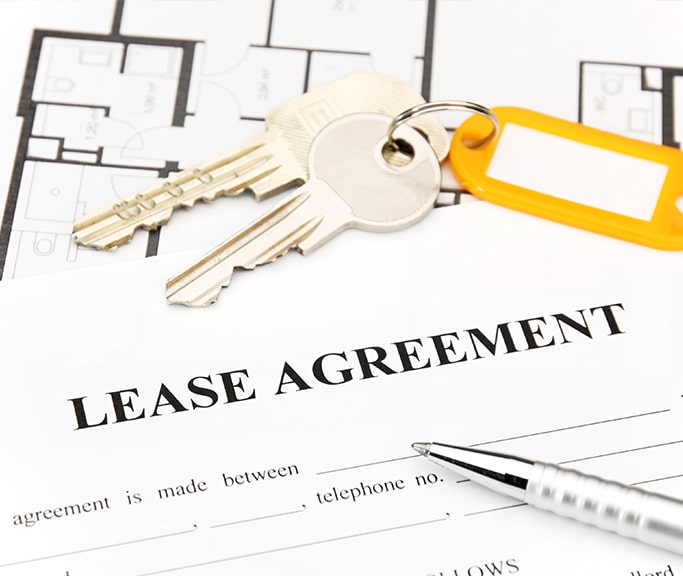Retail and Commercial Leasing
Preparing and examining retail and commercial lease contracts can be challenging, even for experienced business owners. Having a clear understanding of your responsibilities and obligations is crucial to smooth business operation and profitability.
Solutions Law will guide you through the process of examining and preparing a contract that can adapt to business changes and works for you, not against you.

Quick links
Lease period & options
Your lease period determines how long you will be able to stay in your premises. Negotiating a suitable lease period will depend on many factors. A business that has just started will have a different set of priorities than an established business. Once your lease has expired without the option to extend, your landlord is not obliged to renew it which can severely impact your ability to run your business.
The inclusion of options will allow you to extend your lease at a specified time, for a specific period of time. A ‘two plus two’ option translates to a fixed two year lease with the option of renewing for another two years. Whereas a ‘two by three’ option translates to a fixed two-year lease with an optional second two-year lease and an optional third two-year lease.
Remember, landlords are not required to provide options, but you can always negotiate option/s into the lease.
Lease disclosure statements
The primary function of lease disclosure statements allows both landlord and tenant to note any conditions that may affect either parties decision to enter a lease.
Your solicitor should examine the disclosure statements as they are considered part of the legally binding agreement you are entering. Careful attention is required to make sure all the agreements negotiated are in fact included. Covered will be:
- Length of lease and options
- Rent amount and review method
- Outgoings and other costs
- Trading hours


Rent and outgoings
One of your largest ongoing outgoings will be rent. When considered over the total length of the lease, it is understandable why a landlord will want to maximise rent and a tenant will conversely want to minimise rent.
As a tenant you are obliged to continue paying your outgoings regardless of the challenges your business faces.
Any changes in outgoings are to be clearly stated in the lease, including changes in rent and the method used to calculate the new amount.
Other outgoings can include management, operation, cleaning and land taxes. Seek clarity as to when these are expected to be paid.
Permitted use
Your lease outlines the type of business you are permitted to run from the premises. Understanding local council permissions and restrictions is also recommended. Although your focus is likely to be on the immediate future, consider any business changes in the mid to long term. Opportunities that fall outside your immediate business function may present and lease restrictions could stand in the way of new growth activities.
Researching similar businesses to get a feel for how they have diversified and adapted to changes can provide some handy insights.


Protection under the Retail Leases Act
For a lease to be covered by the Retail Leases Act it must:
- Be less than 1000 square meters in size
- Sell and supply goods and services
- Be a retail business
Retail leases offer additional safeguards for both landlords and tenants. In contrast commercial leases have more freedom in the lease structure, terms and conditions. Commercial leases can appear to favour landlords and great care should be exercised by tenants during the negotiation phase.
Works, repairs, relocations and demolitions
The lease should specifically state who is responsible for repairs and maintenance. Negotiating fair terms could include the landlord being responsible for major building items while the tenant responsible for inner surfaces like walls, ceilings and floors. Consider a building inspection prior to entering the lease, a small investment may yield savings down the road.
Check for a relocation or demolition clause in the lease and understand your rights if enforced. You could be forced relocate to alternate premises provided in certain conditions. Refurbishment, redevelopment or extension of premises are common reasons.


Copies and registration of lease
Your executed retail and commercial leasing contracts are important and copies should be kept by the landlord and tenant. The contracts outline all terms and conditions agreed to. The landlord or agent acting on behalf of the landlord is required to give a copy to the tenant at the beginning of negotiations.
Both retail and commercial leases can be registered with the NSW Land Registry Services and copies can be obtained if required.
Enquire with Anthony today:
Anthony Buda
LAWYER - PARTNER ADMITTED 2004
Anthony has a passion for all matters relating to business and commercial law. His approach is direct, practical and focused on achieving commercially favourable results for all his clients.
He often assists landlords and tenants in structuring, examining and negotiating leases and commercial agreements to reduce expenses where possible. Anthony’s experience stretches from simple standalone commercial properties to shopping centres and industrial areas.